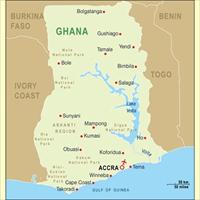UNDP supports women to enhance their productivity

The Country Director of the United Nations Development Programme (UNDP) Ghana Dr. Kamil K. Kamaluddeen has visited the Multifunctional Platform (MFP) Project at Changnayili, a community near Tamale.
The Country Director was joined by officials from Embassy of Japan in Ghana (Accra) and the Ministry of Foreign Affiars in Japan to monitor the usage of MFP and also interact with the Tizaa-dini Women’s Group. The activity was implemented by New Energy, an NGO based in Tamale, under the MFP project which was funded by the UN Trust Fund for Human Security under the Government of Japan through UNDP’s Regional Energy and Poverty Programme.
The Multi-functional Platform (MFP) is a machine run by diesel, with grinding mills, de-huskers, oil presses, battery charger, etc., and helps mainly women's income generation activities. It started early 1990s in Mali. UNDP started supporting Burkina, Senegal, Guinea and Cote D'Iovire in 1999.
Ghana had a project from April 2005 to March 2008 through UN Trust fund for Human Security. Under that project, we have established a total 40 MFPs around Atebubu, Salaga and Tamale.The platform has a configuration of 10hp diesel engine, a mill, a rice huller and solar lighting. It makes an average profit of 17% of the income generated.
UNDP also supported the training of the management committee members in basic maintenance on the equipment. Consequently, they liaise with the operator to oversee the day-to-day functioning of the facility.The management committee, 6 females and 1 male secretary, has successfully run the platform. They thanked UNDP for the immense support.
They demonstrated their skills and shared their experiences with other the entourage. The women said the platform has enhanced their productivity and saved their times for other activities. While processing other grains, most of the women engage in groundnut processing especially which also earns them some proceeds from oil extraction.
The Country Director applauded the hardworking women of the Tizaa-dini Women’s Group which now has fifty-two (52) members. He said he believed UNDP can rely on them to share the opportunity with neighboring communities’ whiles sharing their skills, and experiences with other women. He also expressed UNDP’s interest to collaborate with strategic partners for the up scaling of MFP.
 Back and Next - Back and Next
Back and Next - Back and Next See Also - See Also
See Also - See Also